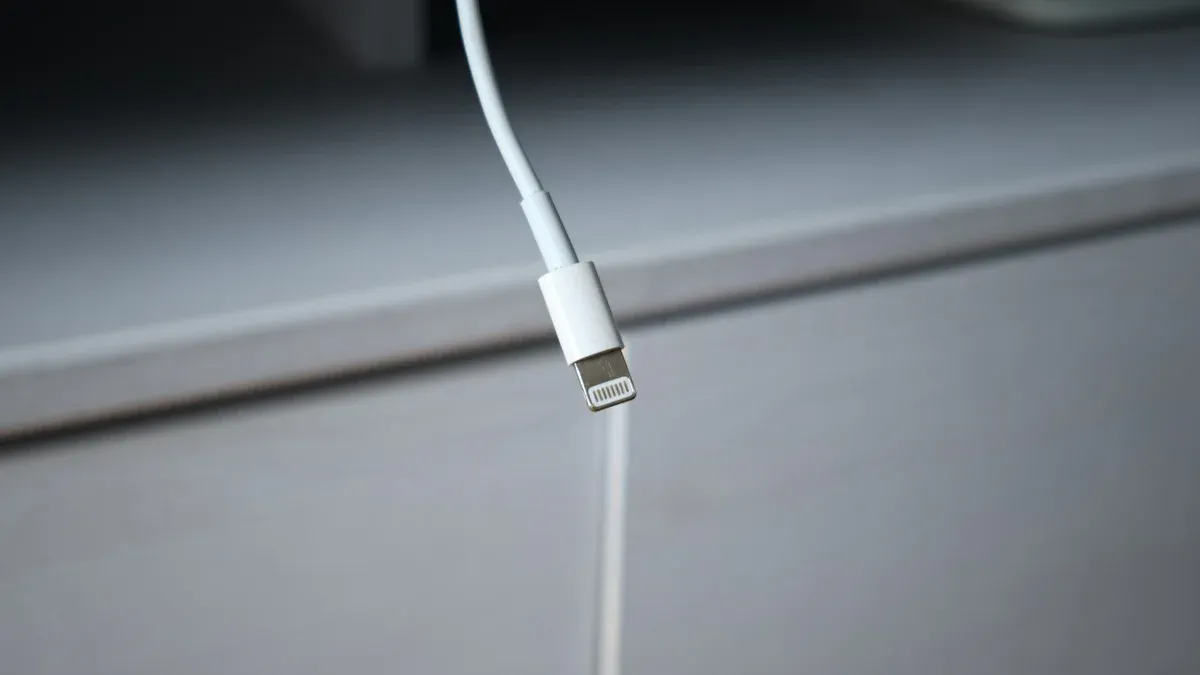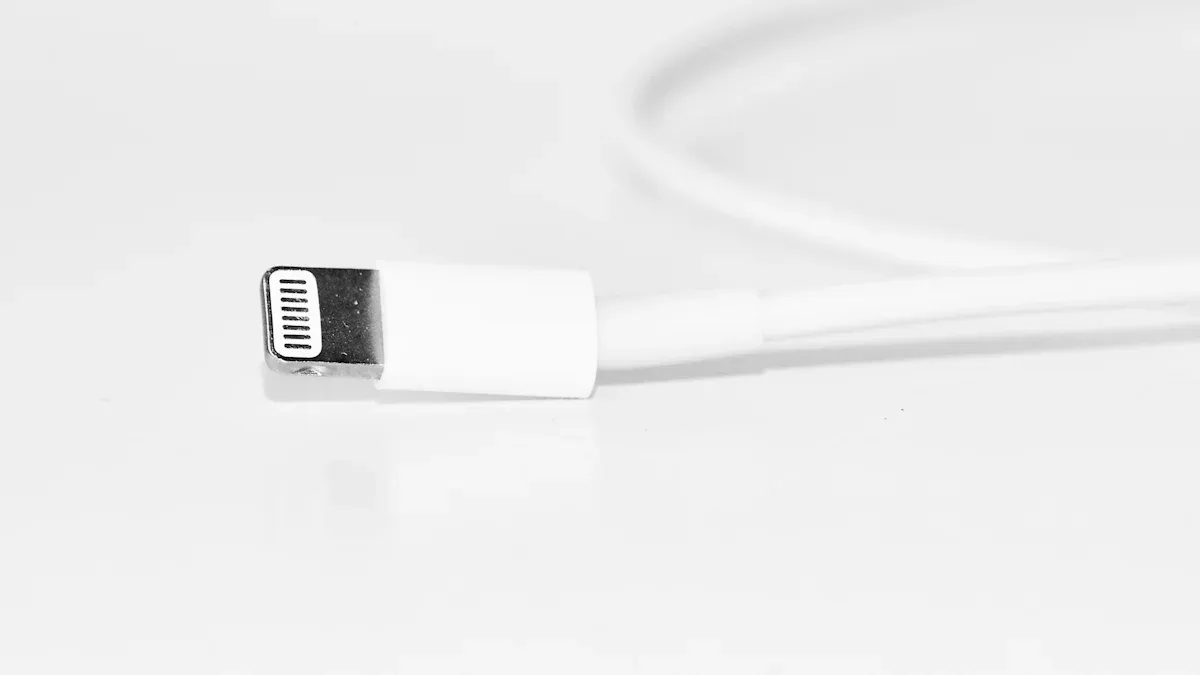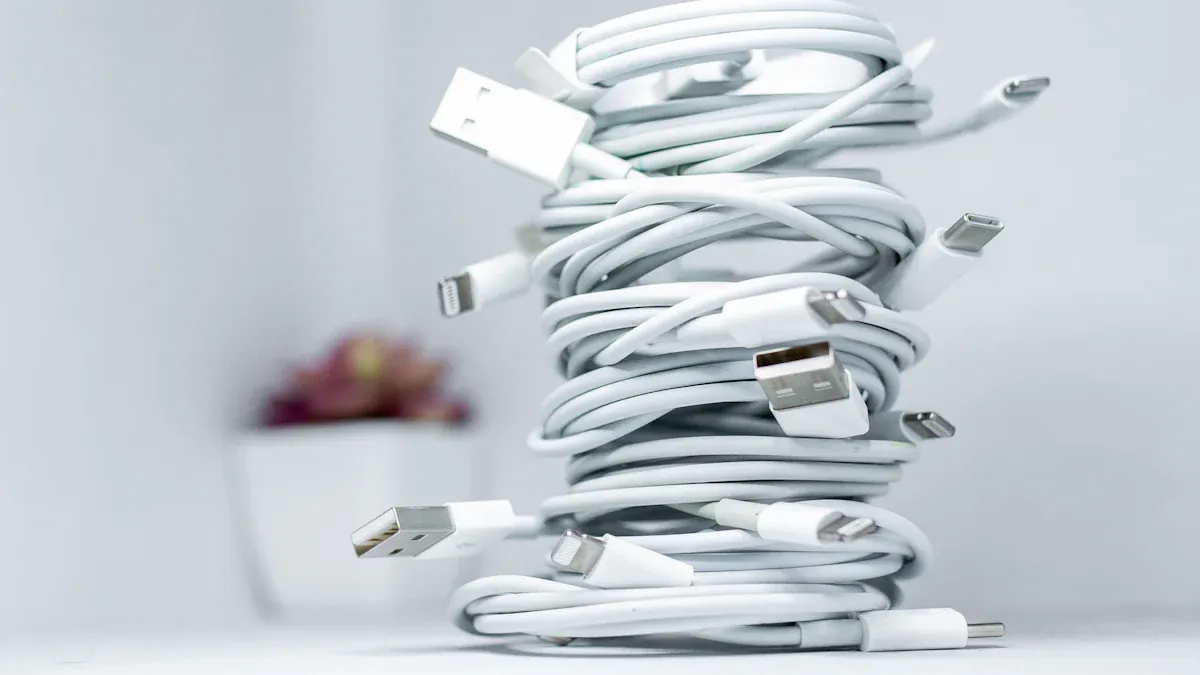Finding a trusted manufacturer for your iPhone charger cable isn’t just about convenience—it’s about safety and performance. Cheap, low-quality cables can overheat, damage your device, or even fail to support fast charging. Apple compatibility ensures your cable meets specific voltage requirements, like 2V for D+ and D- in Apple .5A chargers, for faster charging and reliable performance.
Key Criteria for Reliable iPhone Charger Cable Manufacturers
Certifications and Apple Compliance
When you’re looking for a reliable iPhone charger cable, certifications are your first checkpoint. Apple has strict compliance standards to ensure that cables work seamlessly with their devices. Manufacturers must meet these standards to guarantee compatibility and safety. Without proper certifications, you risk using cables that could overheat, fail to support fast charging, or even damage your device.
Apple’s compliance requirements also extend to USB-C cables and USB-C to USB-C options, which are becoming increasingly popular. These cables must meet specific voltage and data transfer standards to ensure they work efficiently with Apple devices. Always check for certifications like CE, FCC, or RoHS, as they indicate adherence to safety and environmental standards.
Tip: Look for manufacturers that openly display their certifications. Transparency is a good sign of trustworthiness.
MFi Certification and Its Importance
MFi (Made for iPhone/iPad/iPod) certification is non-negotiable when it comes to Apple accessories. This program ensures that the charging cable or accessory meets Apple’s performance and safety standards. An MFi-certified cable guarantees compatibility with your iPhone, whether you’re using a USB-C to Lightning or a traditional Apple Lightning cable.
Why does this matter? Non-MFi cables might not support fast charging or data transfer at optimal speeds. Worse, they could damage your device’s internal components. MFi certification also ensures that the cable can handle Apple’s evolving standards, like the shift to USB-C in newer models.
Did you know? Apple’s MFi program includes rigorous testing to ensure cables can handle both charging and data transfer without compromising device safety.
Customer Reviews and Market Reputation
Customer reviews are like a window into a manufacturer’s reliability. Before you commit to a purchase, take a few minutes to read what other users are saying. Are the cables durable? Do they support fast charging and data transfer as promised? Are there complaints about overheating or poor build quality?
Reputable manufacturers often have a strong market presence and positive reviews across multiple platforms. They also tend to offer warranties or guarantees, which shows confidence in their products. Keep an eye out for brands that specialize in Apple-compatible accessories, as they are more likely to understand the nuances of Apple’s requirements.
Pro Tip: Look for reviews that mention specific features like USB-C to USB-C compatibility or the ability to handle high-speed data transfer. These details can help you make an informed decision.
Quality Assurance and Manufacturing Standards
Quality assurance is the backbone of any reliable charging cable. Manufacturers that prioritize quality often adhere to strict manufacturing standards. Metrics like First Pass Yield (FPY) and Compliance Audit Success Rate are critical in ensuring that every cable meets safety and performance benchmarks.
Here’s a quick look at some key quality metrics:
| Metric | Description |
|---|---|
| First Pass Yield (FPY) | Measures the percentage of products manufactured correctly the first time without rework. |
| Cost of Poor Quality (COPQ) | Encompasses all costs associated with defects, including rework, scrap, and inspection. |
| Customer Satisfaction Index | Provides insights into the effectiveness of quality management efforts based on customer feedback. |
| Compliance Audit Success Rate | Evaluates the effectiveness of the Quality Management System in meeting regulatory requirements. |
High-quality manufacturers also invest in advanced cable management solutions to ensure durability and efficiency. This is especially important for USB-C cables and USB-C to Lightning options, which need to handle both charging and data transfer seamlessly.
Note: The demand for high-performance cables is growing, driven by the need for faster charging times and compatibility with various devices. Choose manufacturers that stay ahead of these trends.
Challenges in Apple-Compatible Charging Cable Production
Apple’s Licensing and MFi Program
Apple’s licensing and MFi (Made for iPhone) program set the bar high for manufacturers. To produce Apple-compatible cables, manufacturers must meet strict requirements. This includes ensuring the cables work seamlessly with Apple devices and pass rigorous testing. The MFi certification process is not just about quality; it’s also about safety. Apple wants to ensure that every cable meets its standards for charging and data transfer.
For manufacturers, this process can be daunting. The certification involves significant costs, and failing to meet Apple’s standards can lead to delays or even rejection. If you’re considering a manufacturer, make sure they have experience navigating Apple’s licensing process. It’s a clear sign they know how to produce reliable cables that won’t damage your device.
Tip: Always check if a manufacturer has successfully completed Apple’s MFi certification for their products. It’s a quick way to gauge their expertise.
Maintaining Consistent Quality
Producing high-quality cables consistently is no small feat. Manufacturers must adhere to strict quality control standards to meet industry regulations and ensure safety. This involves regular testing and inspections to catch defects early. Without these measures, cables might fail to support fast charging or data transfer, or worse, they could pose safety risks.
Reports on wire and cable production highlight how crucial it is to maintain these standards. Non-compliance can lead to legal issues and penalties, which can hurt a manufacturer’s reputation. For you, this means choosing a manufacturer that prioritizes quality assurance. Look for those who invest in advanced testing methods and have a proven track record of delivering reliable products.
Note: Consistent quality isn’t just about avoiding defects. It’s about ensuring every cable performs as expected, whether it’s a USB-C to USB-C cable or a traditional Lightning cable.
Balancing Costs and Compliance
Balancing production costs with compliance is one of the biggest challenges manufacturers face. Apple’s MFi certification program significantly increases production costs. Manufacturers must use advanced materials and technologies to meet Apple’s standards. This includes compatibility testing for various devices, which adds complexity and resource demands.
Here are some factors that drive up costs:
– Compliance with Apple’s MFi certification program.
– Maintaining high-quality standards to satisfy consumer expectations.
– Using advanced materials for durability and performance.
– Conducting extensive compatibility testing, especially for USB-C cables.
– Meeting the demand for high-performance cables at competitive prices.
For smaller manufacturers, these challenges can be overwhelming. However, established manufacturers often find ways to balance these costs without compromising on quality. When evaluating a manufacturer, consider how they manage this balance. It’s a good indicator of their reliability.
Adapting to Apple’s Evolving Standards
Apple’s standards are always evolving, and manufacturers must keep up. The shift to USB-C in newer devices is a prime example. Manufacturers now need to produce USB-C to USB-C cables that support fast charging and high-speed data transfer. This requires innovation and adaptability.
Some manufacturers are already leading the way. The introduction of Gallium Nitride (GaN) technology has made chargers more efficient and compact. Strategic partnerships have also helped manufacturers improve product quality and distribution. These efforts show how the industry is adapting to Apple’s changing requirements.
If you’re looking for a manufacturer, choose one that stays ahead of these trends. They’re more likely to produce cables that meet Apple’s latest standards and your expectations.
Pro Tip: Manufacturers that invest in innovation, like GaN technology, are better equipped to handle Apple’s evolving standards. Keep an eye out for these forward-thinking companies.
Tips for Evaluating iPhone Charger Cable Manufacturers
Checking for MFi Certification
When evaluating manufacturers, always verify if their products are MFi-certified. This certification ensures the charging cable meets Apple’s safety and performance standards. Without it, you risk using cables that might not support fast charging or could damage your device.
Here’s how you can confirm MFi certification:
– Look for the MFi logo on the packaging.
– Check the packaging label for a clear MFi certification statement.
– Use Apple’s official MFi-certified accessory checker online.
– For professional verification, use a lightning cable tester or Apple Lightning cable identifier.
Tip: If a manufacturer openly displays MFi certification details, it’s a strong sign of reliability.
Assessing Production Capacity
A manufacturer’s production capacity tells you if they can deliver quality cables consistently. Look for metrics that highlight their efficiency and quality control.
| Metric/Practice | Description |
|---|---|
| Throughput | Measures how much output the manufacturer can achieve. |
| Consistency | Ensures uniform quality across all products. |
| Quality Control Checkpoints | Inspections at various stages to catch defects early. |
| Automated Testing Rigs | Technology used for efficient and reliable product evaluations. |
| Continuous Improvement Culture | Focuses on ongoing enhancements in production processes. |
Pro Tip: Manufacturers with a strong focus on quality control and consistency are more likely to produce reliable USB-C to USB-C and USB-C to Lightning cables.
Testing Product Samples
Testing product samples is a smart way to evaluate quality before committing to a manufacturer. You can use statistical methods to assess the performance of the cables.
| Statistical Method | Description |
|---|---|
| Control Charts | Monitor process stability and identify variations over time. |
| Check Sheets | Collect and analyze data to spot defects. |
| Histograms | Visualize data distribution to understand quality characteristics. |
| Pareto Charts | Identify the most significant factors affecting quality. |
| Fishbone Diagrams | Pinpoint potential causes of defects. |
Testing ensures the cables meet your expectations for fast charging, data transfer, and durability.
Reviewing Customer Feedback
Customer feedback offers valuable insights into a manufacturer’s reputation. Reviews can reveal if the cables are durable, support fast charging, and handle data transfer efficiently. Positive feedback often indicates a reliable manufacturer.
Here’s why customer reviews matter:
– They highlight areas for improvement.
– Positive reviews enhance the manufacturer’s reputation.
– Feedback can guide innovation and improve product quality.
Satisfied customers are more likely to recommend the manufacturer, which speaks volumes about their reliability.
Establishing Clear Communication
Clear communication is essential when working with manufacturers. It ensures both parties understand expectations for quality, delivery times, and costs.
Effective communication includes:
– Setting clear expectations and KPIs.
– Regular feedback to address issues early.
– Evaluating how quickly the manufacturer responds to inquiries.
Note: Strong communication fosters trust and ensures a smooth partnership, especially when dealing with customized USB-C cables or other accessories.
Choosing a trusted manufacturer for your charging cable is essential for safety and performance. MFi certification ensures your cable meets Apple’s standards, supporting fast charging and protecting your device. Take time to research manufacturers, read reviews, and test samples. Reliable accessories make a big difference in your charging experience.
FAQ
What is the difference between USB-C and USB-C to USB-C cables?
USB-C is a connector type. USB-C to USB-C cables have USB-C connectors on both ends, enabling faster charging and seamless data transfer between compatible devices.
Why is data transfer speed important for USB-C cables?
Faster data transfer ensures quick file sharing and smooth device syncing. High-quality USB-C cables support these speeds, making them ideal for modern devices and applications.
How do I know if a USB-C cable supports fast charging?
Check the cable’s specifications or packaging. Look for labels like “fast charging” or “PD-compatible.” USB-C to USB-C cables often support higher power delivery for faster charging.



